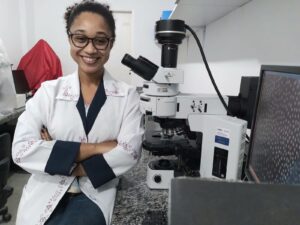Daniele Santos
Summary
I am currently a postdoctoral researcher linked to the Institute of Biodiversity and Sustainability (NUPEM) at the Federal University of Rio de Janeiro at the Integrated Laboratory of Morphofunctional Sciences. My academic and research training is intimately linked to the fields of Molecular Biology, Biochemistry and Morphology of insect pests and disease vectors. I am currently part of the research group in the area of Evolutionary Developmental Biology (Evo-Devo), where I am working with transposon mediated transgenesis technology in the Chagas disease vector Rhodnius prolixus for developmental and regeneration studies. My educational trajectory began with a bachelor’s degree in Biological Sciences from the Universidade Estadual Norte Fluminense (UENF) in 2012, followed by a master’s degree in Sciences from the Federal University of Rio de Janeiro (UFRJ) in 2014, and later a Ph.D in Biological Chemistry in 2021 as well, Also by UFRJ. My academic development was focused on the effects of dietary stress (prolonged fasting) on the regenerative capacity of the intestinal epithelium of Tribolium castaneum and later with emphasis on the characterization of the DNA topoisomerase II enzyme in the Aedes aegypti mosquito. In thislast work I performed different experimental approaches to examine the importance of that enzyme, from the analysis of gene expression by quantitative RT-PCR throughout the mosquito cycle to the elucidation of the effects caused by enzymatic inhibition with etoposide in silico, with molecular modelling and docking, in vitro in the Aag2 cell line and also in vivo in bioassays with larval and pupa stages. My work experience encompasses different technical-scientific approaches, including real-time quantitative RT-PCR, in situ hybridization and fluorescence microscopy, biochemical assays, histochemistry, cell cultivation and maintenance oflaboratory colonies of different model insect research.
